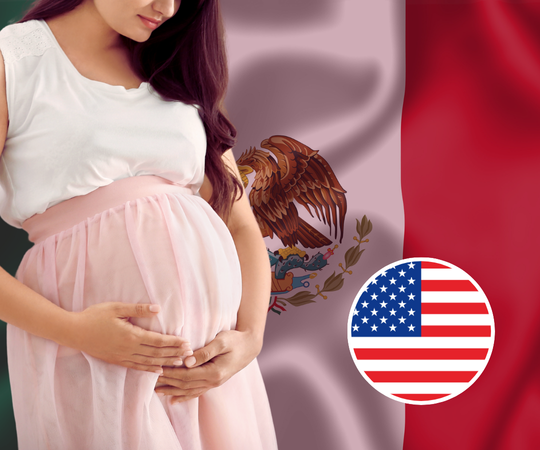Surrogacy in South & Central America is on the rise. Since the war in Ukraine, and with the rising match times and costs of surrogacy in the US and Canada, intended parents have renewed interest in older and emerging destinations. This renewed interest includes destinations in South and Central America such as Mexico, Colombia and recently Argentina.
While none of these have the wealth of professional experience and long case law history, they do have other benefits that are increasingly attracting gay singles, couples and heterosexuals.
These benefits include :
- lower costs,
- fixed cost programs with some service providers
- some jurisdictions permitting both parents listed on the birth certificate, including two dads..
Mexico
A decade ago, the Mexican state of Tabasco had specific laws allowing surrogacy for foreign couples and as a result, thousands engaged there, with the help of agencies based in Cancun, Mexico City and elsewhere. The one proviso was that the surrogacy births needed to take place in Tabasco’s capital Villahermosa.
Tabasco state banned surrogacy some years later, but a number of agencies quietly continued to provide programs centred in cities such as Cancun, Mexico City and more recently Puerto Vallarta. For many gay singles and couples, as well as some heterosexuals priced out of other destinations, this was a compromise they were willing to make.
The Supreme Court has recently confirmed rulings that foreign intended parents using surrogates in Mexico have the right to be recognised as the legal parents of their newborn. Some Mexico-based programs are also offering a ‘pre-registration’ process which involves a Mexican judge making a pre-birth resolution to declare the intended parents as the legal parents. In this case, the first version of the birth certificate issued by the Civil Registry names both parents. The catch here is that each approval is at the discretion of individual judges. As a result, not all agencies even bother to offer this.
Back then, as well as more recently, there have been several damning media stories highlighting both dodgy Mexican agencies, as well as mistreatment of surrogates. Nonetheless, as in any environment, there remain some reputable Mexican agencies who do treat both surrogates and intended parents fairly and honestly.
There has been a huge increase in demand for Mexican surrogacy and with this, prices have been increasing. Some agencies are even reaching out to current clients, offering them new ‘peace-of-mind’ products such as newborn insurance, at inflated rates, to cash in on the demand.
Learn more about surrogacy in Mexico visit www.growingfamilies.org/surrogacy-in-mexico
Colombia
It was 2018 that entrepreneurs first opened surrogacy programs in Bogota and Colombia. These programs were aimed specifically at gay singles and couples. Offering fixed price programs, local IVF clinic Celagem was quickly oversubscribed with gay intended fathers from around the globe. With just one local clinic prepared to work with foreigners, wait times bottlenecked massively. As surrogate availability became exhausted in Bogota, recruiters moved to another large Colombian city, Medellin. More recently, an additional Bogota IVF clinic has started taking on surrogacy cases, so has far lower wait times. However there remains considerable opposition to surrogacy amongst some Colombian members of parliament. Repeatedly, bills have been introduced to ban access by foreigners. While those bills have in the past been defeated, sources close to the issue predict that it may be less than a year before a majority of Colombian politicians vote to support the ban.
Learn more about surrogacy in Colombia visit www.growingfamilies.org/surrogacy-in-colombia
Argentina
Surrogacy has been documented in Argentina since 2013. To date, there have been over 100 cases, mostly to Argentinians and citizens of neighbouring countries. In 2017 Airport Security Police prevented a gay Chilean couple from taking a 38-day-old baby via surrogacy to Chile. When it became apparent that the couple had paid for the service, a Prosecutor investigated the parents. Reported as a minor scandal with homophobic overtones, the case was soon dropped. No-one had broken any laws.
There is no national law pertaining to surrogacy in Argentina. Global pressures have intended parents, from UK, France, Israel, Australia, & Ireland, considering Argentina.
In 2017, the City of Buenos Aires, introduced a judicial ruling, citing the Convention on the Rights of the Child. This judicial ruling guaranteed infants born via surrogacy ‘all opportunities for their full development in conditions of freedom, equality and dignity’. Much of the Judge’s rationale for her decision stemmed from human right and equity arguments. What this means is that surrogacy is recognised for singles and couples, regardless of their marital status, sexuality or nationality. There is currently no distinction made between altruistic, compensated and commercial payments.
When birth occurs in the City of Buenos Aires only the intended parent(s) are recorded on the birth certificate. No court order is required to transfer parentage as long as certain other requirements are met.
There are a limited number of agencies operating in Argentina. Which, is creating significant delays in progressing embryo creation, surrogate screening and matching. Yet given its gay-friendly society and sophisticated culture, larger companies are planning Argentine-based programs, intended parents are willing to engage.
Learn more about Surrogacy in Argentina visit www.growingfamilies.org/surrogacy-in-argentina/



